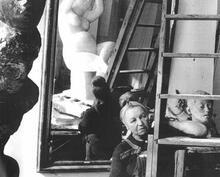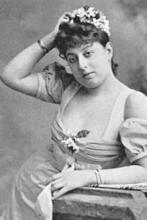Berthe Bénichou-Aboulker
Berthe Bénichou-Aboulker was born in Oran, French Algeria, in 1886. The Bénichous were a prominent Jewish family who owned a famous villa equipped with its own synagogue. Bénichou-Aboulker received a French education, married at the age of twenty-two, and had four children. She was a musician, singer, and painter and an active member of numerous Jewish intellectual circles in Algiers. Bénichou-Aboulker published a number of collections of poems and plays, and after publishing her first play, La Kahéna, reine barbère, in 1933, she became the first woman writer to be published in Algeria. During World War II, her and her family collaborated closely with the Allies in preparation for the landing of US troops in Algiers on November 8, 1942.
Overview and Early Life
Berthe Bénichou-Aboulker was the first woman writer to have her work published in her country of birth, Algeria, whose generous land and mixed population she praised in Pays de flamme (Land of Flame).
Tout croît intensément sur ton sol, Algérie!
Arbres, fleurs et blé d’or protégés par Cérès,
Fruits juteux, fruits de chair: Fatma, Rachel, Inès,
Zohra la mulâtresse ou la blanche Marie.Everything grows intensely in your soil, Algeria!
Trees, flowers and golden wheat protected by Ceres,
Juicy fruit, fruits of flesh: Fatima, Rahel, Inez,
Zohra the mulatto or the white Marie.
Berthe Bénichou was born in Oran (French Algeria) in 1886, the child of Adélaïde Azoubib and her second husband, Mardochée Bénichou. The Bénichous were one of the great Jewish families of Oran, where they owned a famous villa, equipped with its own synagogue. Berthe’s father, a follower of modernity and Frenchification, was the president of the city’s Jewish community. Her mother came from a family of Algerian rabbis whose ancestors included the rabbinical authority, philosopher, and scientist R. Simeon ben Zemah Duran (Rashbaz, 1361–1444). Adélaïde herself was well-educated, literate in both Hebrew and French. In 1922, her children published a collection of her writings, En méditant les livres saints (Meditating on the Holy Scriptures), which contained poems and moral texts with illustrations by Célestine, her eldest daughter. Célestine married Julius Harburger and, like her son Francis, was a painter. She was the child of Adélaïde’s first marriage to the physician Moïse Aboulker (Abulker), who died in 1880. Adélaïde had three children by her second husband—Berthe, Esther, and Raymond. Raymond Bénichou, a writer and well-known philosopher, was looked upon as “the conscience of Algerian Judaism in the twentieth century.”
Like all the women in her family, Berthe Bénichou received a good French education. In 1908, at the age of twenty-two, she married Dr. Henri Samuel Aboulker (1876–1957). A professor of medicine, he served as president of the Radical Party, regional counselor, and deputy mayor of Algiers. The couple had four children: José (b. 1920, professor of neurosurgery in Paris), Marcelle (later Lasry), Colette (later Muscat), who moved with her husband to Jerusalem, and a daughter who died in childhood.
Bénichou-Aboulker combined many talents: a musician and singer, she was also a fine painter and taught her daughter all of these disciplines. An active member of the numerous Jewish intellectual circles which were established in Algiers and other large Algerian cities at the beginning of the twentieth century, she became known through her publications. The earliest of those known to us, La Kahéna, reine berbère (Kahena the Berber Queen), dates from 1933. This is a play in three acts that presents a seventh-century Judeo-Berber heroine who leads an army against the conquest of the Aurès by Arab Muslims. With this work, Bénichou- Aboulker (who always used the hyphenated form of her maiden and married names) probably became the first woman writer published in Algeria. Previously, her compatriot Elissa Rhais had written several novels, but these were issued by large Parisian publishing houses. For her part, Bénichou-Aboulker published only in Algiers. Following La Kahéna, she published a number of collections of poems and plays, although some works, such as Bithia la lépreuse, Gracia Mendèsia, Femmes de lettres (Bithia the Leper Woman, Gracia Mendèsia, Women of Letters), which were advertised in 1935 in an edition of Louise de Lavallière, seem never to have been published. According to her daughter Colette, several works of Bénichou- Aboulker, which were ready for publication by the Algerian publisher Charlot, disappeared during the war as a result of the bombardment of the city.
During World War II, her husband, children, and their cousins collaborated closely with the Allies in preparation for the landing of US troops in Algiers on November 8, 1942. Bénichou-Aboulker, who died that year, never received any of the honors that were bestowed upon many members of her family for their leading role in the Algerian Resistance. Her husband received the Méedaille de la Résistance, her son José was awarded the Croix de la Libération, and her daughter, Colette, the Croix de Guerre.
Berthe Bénichou-Aboulker lives on in her works, which are modest but which, in 1933, marked the entry of Jewish women into Francophone publications in Algeria.
Selected Works by Berthe Bénichou-Aboulker
La Kahena, reine berbère. Algiers: 1933.
Pays de flamme. Algiers: 1935.
Louise de Lavallière. Algiers: 1935 (illustrated by Francis Harburger).
Danses, visions. Algiers: 1939.
Balkis la Sabéenne, Poèmes à, Rébécca and Le Stratagème. Algiers: 1939.
Bénichou-Azoubib, Adélaïde, En méditant les livres saints. Paris: 1922 (drawings by Célestine Harburger).
Ayoun, Richard. “Les Aboulker à travers les âges.” In Recherches sur la culture des juifs d’Afrique du Nord, edited by Issachar Ben Ami, 114–116. Jerusalem: 1991.
Ayoun, Richard, and Bernard Cohen. Les Juifs d’Algérie, deux mille ans d’histoire, Paris: 1982.
Tolédano, Joseph, Les noms de familles juifs d’Afrique du Nord. Jerusalem: 1998.
Les Juifs d’Algérie. Images et textes. Paris: 1987.














